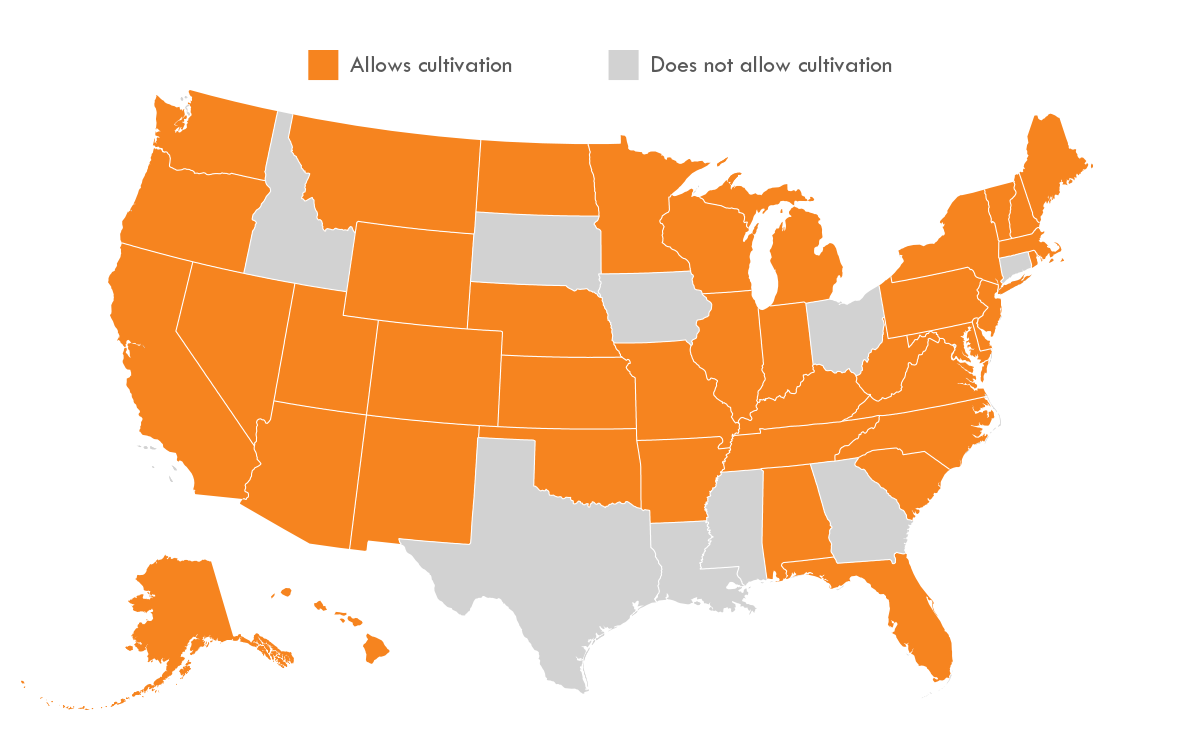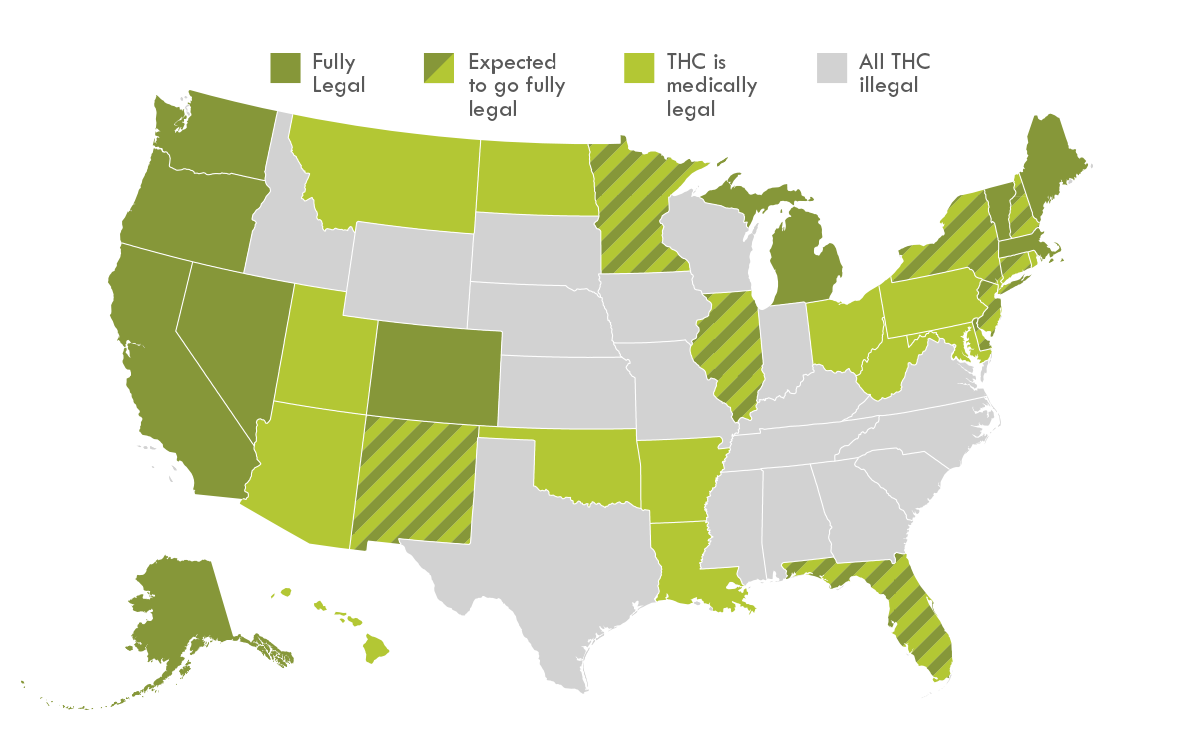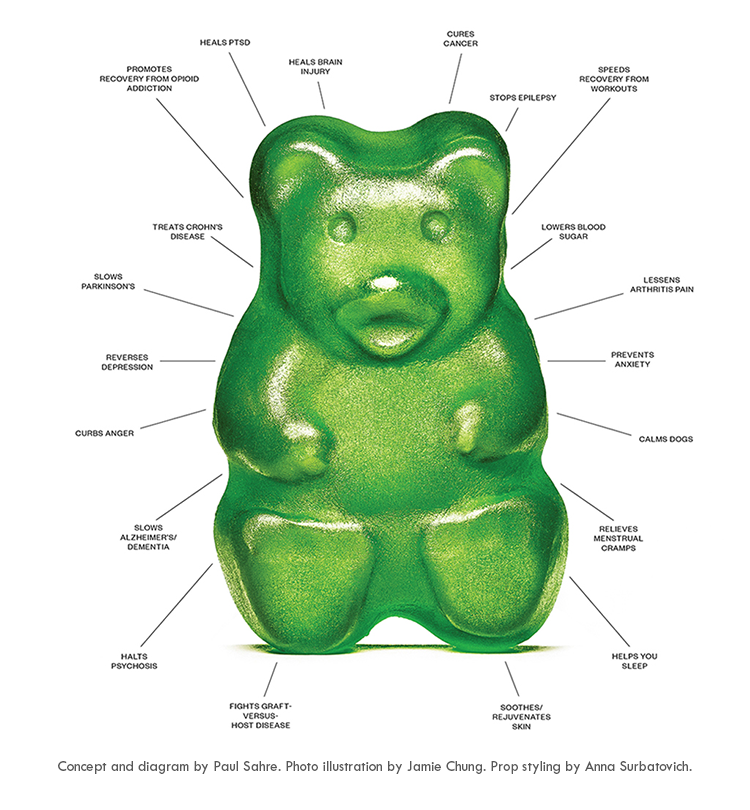CBD versus THC, confusion abounds
Marijuana and hemp are subspecies of the cannabis plant and are similar in many ways. But their chemical properties put them into very different legal and product realms. Each is becoming a big industry in its own right, with medical uses and retail food, beauty and supplement sales penetrating even the smallest markets. While state and federal laws addressing these products—especially marijuana—are not yet in synch, greater clarity is only a matter of time. Meanwhile, farmers across America are planting hemp as a high-value crop in states that have approved its cultivation. The cannabidiol, or CBD, extracted from this hemp shows up in everything from food products to topicals to pills with promises to cure, or at least help, virtually anything that ails you, despite any legitimate research. And marijuana legalization for medical and recreational use continues to march across the country state-by-state.

Here are six things you need to know to stay on top of this trend.
- Acronyms matter: Both hemp and marijuana belong to the ancient Cannabis species, but each has been cultivated for different applications. CBD is a naturally occurring, non-psychoactive compound that can be extracted from both marijuana and hemp plants. Hemp can be high in CBD, but it is naturally very low in tetrahydro cannabidiol (THC), the element with the psychoactive properties. While marijuana is a similar plant that also contains CBD, it has more THC and has been used for medicinal purposes for more than 2,000 years.
- The legal landscape is complex: The 2018 Farm Bill legalized hemp as an agricultural commodity versus an illegal drug and it’s now being legally grown for thousands of industrial purposes. Cannabidiol from hemp plants is legal in the U.S., but CBD extracted from other cannabis plants (including marijuana) is still illegal at the federal level even though it may be legal under certain state laws.According to Joel Chappelle, an attorney and consultant with the Food Industry Counsel, LLC, although hemp prohibition has effectively ended, it will be subject to stringent regulations including ensuring the THC level remains below 0.3%. “Importantly, hemp may now be introduced into interstate commerce and many of the onerous restrictions on the sale, transport, or possession of hemp-derived products have been eliminated.”

- The CBD miracle includes virtually no research: Discovered in 1940, CBD has shown beneficial medicinal properties anecdotally. However, due to its status as a Schedule 1 drug under the Controlled Substances Act of 1970, research on any part of the Cannabis plant species is prohibited. Current CBD claims include:

Despite its designation, absence of research and FDA approval, the CBD market is expected to hit a $22 billion product by 2022, buoyed by experts including Dr. Sanjay Gupta’s qualified endorsement on the Dr. Oz Show.
- A remarkable transformation: Public opinion on marijuana and CBD has undergone an astounding shift over the past quarter century. For example, in 1995, the sale of marijuana and CBD was illegal in all 50 states. But in 2018, legal product sales reached $10.4 billion.
- 35 states have legalized marijuana for medicinal use
- Illinois recently became the 11th state to legalize marijuana for medicinal and recreational use
Today, more than 60% of Americans support legalization versus 31% in 2000. Some experts attribute this change to an increase in positive media around CBD’s medicinal properties, while others cite a growing awareness of social injustice in the criminal system related to marijuana possession and still others point to a growing need to alleviate the anxiety and stress permeating our culture.
- It’s a blockchain laboratory: Because of state and municipal use laws, the cannabis market continues to use blockchain technology to trace the substance from consumer to product to the exact plant and grower. Food companies are increasingly looking to cannabis companies to help them understand how other markets can benefit from these traceability capabilities.
- Complex regulation for safety is required and questions abound: Since hemp grows quickly, its phytoremediation qualities can leech contaminants and heavy metals from the soil. It was used to help clean up the toxic soil in the Ukraine after the Chernobyl nuclear power plant meltdown in the late 1980s. How can the quality of the plant product be controlled when soils differ across the country?
Cannabis is used in many different applications, including food, beverage, medicine, supplement, smoking and animal feed. How can product safety be controlled based on all the different applications?
Although sales of marijuana and the production and sales of food with CBD is still technically illegal based on current federal law, states continue to make products legal without federal repercussions.
And, beyond all of that, banking remains a huge problem. Since banks are federally regulated, they can’t legally work with companies growing, processing or selling marijuana. It’s largely a cash business.
“Although the cannabis market presents many potentially lucrative and exciting business opportunities, wide-ranging legal and regulatory pitfalls remain,” says Chappelle. “Accordingly, we advise companies looking to enter the cannabis market to proceed with the utmost caution.”
C|O Insight
From farming to processing to retail sales, hemp, marijuana and CBD are causing important shifts in many markets. Given all the confusion out there, the clarity of your position could determine whether your CBD-infused brands are embraced or rejected. Are you ready? No matter where you are in the value chain—farmer to processor to manufacturer to retailer to restaurant—our food system finds itself under greater scrutiny than ever. The team at C|O focuses on food and ag. We understand the dynamics at play and are ready to help your organization, company or brand succeed in this exciting time of tumultuous change.
C.O.nxt Insight.
Our team of subject matter experts focuses on food and agriculture—farm field to processing to entrée on a plate. We can help you build a new brand, protect an old one or target customers to foster sales. Let’s talk when the time is right to handle your next strategic marketing and communications challenge: Marcy Tessmann, marcy@co-nxt.com.
SHARE THIS STORY
What Would You Solve in 30 Days?
Every brand faces moments when clarity, momentum, or alignment are lacking. Sometimes it’s a new product that needs a smart go-to-market plan. Other times, it’s a shift in the business that calls for a tighter
